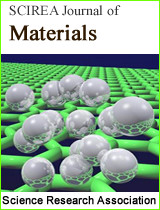Influence of Quantized Vortex Dynamics on Superconducting Detectors
DOI: 10.54647/materials430241 75 Downloads 186415 Views
Author(s)
Abstract
Superconducting materials are currently the subject of interest in modern electronic technologies, especially because they exhibit quantum phenomena on a macroscopic scale. The most evident examples are quantized vortices transporting magnetic flux, which movement determines the macroscopic current carrying phenomena in the superconducting materials. The present paper is intended to an analysis of the influence vortex dynamics, it is of the movement of the pancake type vortices in HTc multilayered superconductors in the flux creep process on their current-voltage characteristics and then critical current density. These are the essential parameters characterizing the superconducting electronic quantum devices, such as Josephson junctions detectors, bolometric or SQUiD type, current leads and superconducting magnets. In the paper is shown how various initial states of the captured vortices and their shape influence the pinning potential barrier and then current-voltage characteristics. It has been presented how fitting the current-voltage characteristics obtained in model to experimental data allows to determine the material parameters of the HTc superconductors such as nano-sized defects concentration, parameter influencing significantly the properties of sensitive superconducting detectors working in irradiation environment. Next critical current density of the superconducting materials in the vortex dynamics model has been analyzed as the function of the irradiation dose creating the nano-sized defects, for various values of the magnetic induction. Initial enhancement of the critical current results from the new pinning centers creation during irradiation. At the same time, the characteristic maximum of this dependence and following it decrease has been interpreted as related to the destructive action on the crystal lattice of the high dose of irradiation. Then the vortex dynamics analysis of HTc superconductors was applied for the interpretation of the dynamic anomalies of the current-voltage characteristics in a slowly varying magnetic field, which effect can be used in superconducting electromagnetic sensors, as well as for the description of the irradiation from long Josephson's junctions with rotating vortex between the Josephson's junctions covers. Finally, the results of the previous investigations of the superconducting semiconductors with vacancies of lanthanum La3-xVacxSe4 are enclosed, possible class of the materials useful for the construction of the joined superconducting – semiconducting electronic quantum devices.
Keywords
quantized vortices in superconducting materials, static and dynamic current-voltage characteristics, superconducting detectors, Josephson's junctions; superconducting semiconductors
Cite this paper
Jacek Sosnowski,
Influence of Quantized Vortex Dynamics on Superconducting Detectors
, SCIREA Journal of Materials.
Volume 8, Issue 2, April 2023 | PP. 50-62.
10.54647/materials430241
References
| [ 1 ] | G. Blatter, M. V. Feigel'man, V. B. Geshkenbein, A. I. Larkin, and V. M. Vinokur, Vortices in high-temperature superconductors, Rev. Mod. Phys. 66, 1125 (1994) DOI:https://doi.org/10.1103/RevModPhys.66.1125 |
| [ 2 ] | K. Pomorski, P. Pęczkowski, R. Staszewski, Analytical solutions for N interacting electron system confined in graph of coupled electrostatic semiconductor and superconducting quantum dots in tight-binding model, Cryogenics, 109, 103117 (2020), https://doi.org/10.1016/j.cryogenics.2020.103117 |
| [ 3 ] | K. Pomorski et al., From two types of electrostatic position-dependent semiconductor qubits to quantum universal gates and hybrid semiconductor-superconducting quantum computer: SPIE, Proceedings Superconductivity and Particle Accelerators 2018, 110540M, Kraków, Poland (2019), DOI https://doi.org/10.1117/12.2525217 |
| [ 4 ] | C.A. Aguirre a, H.B. Achic a b, J. Barba-Ortega c Mesoscale vortex pinning landscapes in a two component superconductor, Physica C: Superconductivity and its Applications, Volume 554, 8-14 (2018), https://doi.org/10.1016/j.physc.2018.08.010 |
| [ 5 ] | C. A. Aguirre a, A.S. de Arruda a, J. Faúndez b, J. Barba-Ortega c ZFC process in 2+1 and 3+1 multi-band superconductor, Physica B: Condensed Matter, Vol 615, 413032 (2021), DOI https://doi.org/10.1016/j.physb.2021.413032 |
| [ 6 ] | C.A. Aguirre a, M.R. Joya b, J. Barba-Ortega On the vortex matter in a two-band superconducting meso-prism, Physica C: Superconductivity and its Applications, Vol. 585, , 1353867 (2021), DOI https://doi.org/10.1016/j.physc.2021.1353867 |
| [ 7 ] | HK Kundu, KR Amin, J Jesudasan, P Raychaudhuri, Effect of dimensionality on the vortex dynamics in a type-II superconductor, Physical Review B, (2019) DOI 10.1103/PhysRevB.100.174501 |
| [ 8 ] | J Srpčič et al., Flux vortex dynamics in type II superconductors, Supercond. Sci. Technol. 33 014003 (2020) DOI 10.1088/1361-6668/ab5b53 |
| [ 9 ] | Y. Mawatari, The Time-Dependent Ginzburg-Landau Theory, https://annex.jsap.or.jp/fluxoid/en/img/file1.pdf, 150913, |
| [ 10 ] | M. Cyrot. Irreversible effects and pinning. Journal de Physique, 33 (8-9), pp.803-810 (1972) DOI 10.1051/jphys:01972003308-9080300. jpa-00207308 |
| [ 11 ] | J. Sosnowski, New approach to pancake vortices interaction with nano-sized defects in HTc superconductors, Modern Physics Letters B, 28, no 16, p. 1450132-1-1450132-11 (2014) DOI: 10.1142/S0217984914501322 |
| [ 12 ] | J. Sosnowski, V. I. Datskov, Normal and inverse anomaly of dynamical current-voltage characteristics of high Tc oxide superconductors, Cryogenics 33 1, 107 – 111 (1993) DOI 10.1016/0011-2275(93)90086-4 |
| [ 13 ] | J. Sosnowski, V. I. Datskov, Normal and inverse peak effect in high Tc oxide superconductors, Progress oin High Temperature Superconductivity v. 30, p. 308-3213 (1992), World Scientific, Singapur |
| [ 14 ] | J. Sosnowski, Superconducting properties of lanthanum selenide, Phys. Stat. Sol. (b) 72, 403 (1975), DOI https://doi.org/10.1002/pssb.2220720145 |

